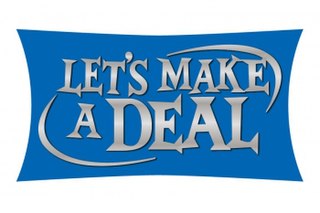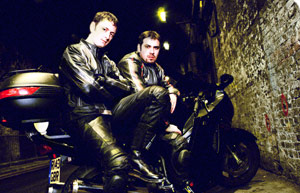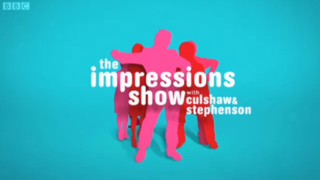Related Research Articles

A game show is a genre of broadcast viewing entertainment where contestants compete for rewards. The shows can be either participatory or demonstrative, and are typically guided by a host who explains the rules of the game as well as commentating and narrating where necessary. The history of the game shows dates back to the late 1930s when both radio and television game shows were broadcast. The genre became popular in the United States in the 1950s, becoming a regular feature of daytime television.

The Weakest Link is a British television quiz show, mainly broadcast on BBC Two and BBC One. It was devised by Fintan Coyle and Cathy Dunning and developed for television by the BBC Entertainment Department. The game begins with a team of nine contestants, who take turns answering general knowledge questions within a time limit to create chains of nine correct answers in a row. At the end of each round, the players then vote one contestant, "the weakest link", out of the game. After two players are left, they play in a head-to-head penalty shootout format, with five questions asked to each contestant in turn, to determine the winner.

David Dickinson is an English antiques dealer and television presenter. Between 2000 and 2004, Dickinson hosted the BBC One antiques show Bargain Hunt, where he was succeeded by Tim Wonnacott. Dickinson left the BBC in 2005, and since 2006 he has been hosting the ITV daytime show Dickinson's Real Deal. The show sees members of the public bringing antiques and collectables to sell to a dealer or take to the auction.
Sales promotion is one of the elements of the promotional mix. The primary elements in the promotional mix are advertising, personal selling, direct marketing and publicity/public relations. Sales promotion uses both media and non-media marketing communications for a pre-determined, limited time to increase consumer demand, stimulate market demand or improve product availability. Examples include contests, coupons, freebies, loss leaders, point of purchase displays, premiums, prizes, product samples, and rebates.
A grey market or dark market is the trade of a commodity through distribution channels that are not authorized by the original manufacturer or trade mark proprietor. Grey market products are products traded outside the authorized manufacturer's channel.

Susannah Caroline Constantine is an English former TV fashion journalist, writer, style advisor, television presenter, author and clothes designer. Her second book, What Not to Wear, co-written with her fashion partner Trinny Woodall, won her a British Book Award and sold 670,000 copies.

Let's Make a Deal is a television game show that originated in the United States in 1963 and has since been produced in many countries throughout the world. The program was created and produced by Stefan Hatos and Monty Hall, the latter serving as its host for nearly 30 years.

Waitrose Limited, trading as Waitrose & Partners, is a brand of British supermarkets, founded in 1904 as Waite, Rose & Taylor, later shortened to Waitrose. It was acquired in 1937 by employee-owned retailer John Lewis Partnership, which still sells groceries under the brand. Its head offices are located in Bracknell, Berkshire.

Online shopping is a form of electronic commerce which allows consumers to directly buy goods or services from a seller over the Internet using a web browser or a mobile app. Consumers find a product of interest by visiting the website of the retailer directly or by searching among alternative vendors using a shopping search engine, which displays the same product's availability and pricing at different e-retailers. As of 2020, customers can shop online using a range of different computers and devices, including desktop computers, laptops, tablet computers and smartphones.

Watchdog is a British consumer investigative journalism programme that was broadcast on BBC One from 14 July 1985 to 17 October 2019. The programme focused on investigating complaints and concerns made by viewers and consumers over problematic experiences with traders, retailers and other companies around the UK, over customer services, products, security, and possible fraudulent/criminal behaviour. Since it first began, the programme had achieved great success in changing the awareness consumers have of their purchasing rights, as well as pushing forward for changes in company policies and consumer laws, and in some cases helping to close down businesses whose practices have left many people dissatisfied and out of pocket. The show's longstanding slogan was "the programme you cannot afford to miss".
In marketing, a rebate is a form of buying discount and is an amount paid by way of reduction, return, or refund that is paid retrospectively. It is a type of sales promotion that marketers use primarily as incentives or supplements to product sales. Rebates are also used as a means of enticing price-sensitive consumers into purchasing a product. The mail-in rebate (MIR) is the most common. A MIR entitles the buyer to mail in a coupon, receipt, and barcode in order to receive a check for a particular amount, depending on the particular product, time, and often place of purchase. Rebates are offered by either the retailer or the product manufacturer. Large stores often work in conjunction with manufacturers, usually requiring two or sometimes three separate rebates for each item, and sometimes are valid only at a single store. Rebate forms and special receipts are sometimes printed by the cash register at time of purchase on a separate receipt or available online for download. In some cases, the rebate may be available immediately, in which case it is referred to as an instant rebate. Some rebate programs offer several payout options to consumers, including a paper check, a prepaid card that can be spent immediately without a trip to the bank, or even as a PayPal payout.
A pre-order is an order placed for an item that has not yet been released. The idea for pre-orders came because people found it hard to get popular items in stores because of their popularity. Companies then had the idea to allow customers to reserve their own personal copy before its release, which has been a huge success.
Rani Price is a British television presenter who has presented a variety of children's shows for CBBC Channel, Disney, Channel 5 and Nickelodeon.

Rogue Traders is a BBC One investigative/undercover consumer affairs television programme starring Matt Allwright, an investigative journalist, and Dan Penteado, a private investigator and Allwright's co-host. The show focuses on investigating and exposing the dubious work practices of tradespeople and businesses who have received complaints against them from their customers, often through the use of hidden cameras and rigged situations, sometimes sending members of the show's research team undercover to secretly record any training methods taught to a business' employees that is suspicious or unethical.
Dominic Littlewood, known as Dom Littlewood, is a British television journalist and British television presenter who specialises in consumer protection. He is best known for his roles with BBC and Channel 5, presenting programmes such as Fake Britain, Cowboy Builders, Saints and Scroungers and Don't Get Done, Get Dom.

Martin Steven Lewis CBE is an English financial journalist and broadcaster. Lewis founded the website MoneySavingExpert.com. He sold the website in 2012 to the Moneysupermarket.com group for up to £87 million. Lewis is currently a presenter for ITV, on the morning shows Good Morning Britain and This Morning since 2007. He also presents The Martin Lewis Money Show.
Heir Hunters is a BBC television programme focusing on attempts to find missing or unknown heirs, entitled to deceased people's estates before the British Treasury lawfully collects the money. The show follows the work of probate researchers from a number of different firms to show how the results of time-consuming research turned out. The main firms followed have been Fraser and Fraser, Celtic Research and Finders International.

In retail, a product return is the process of a customer taking previously purchased merchandise back to the retailer, and in turn receiving a refund in the original form of payment, exchange.

The Impressions Show is a British comedy sketch show which stars impressionists Jon Culshaw and Debra Stephenson. A second series began broadcasting on 14 November 2010 and ended on 23 December 2010. A third series started on 26 October 2011 at 8.30pm on BBC One. The show was nominated for a National Television Award in the category of Comedy in 2011, but failed to make the top four.
In consumer rights legislation and practice, a cooling-off period is a period of time following a purchase when the purchaser may choose to cancel a purchase, and return goods which have been supplied, for any reason, and obtain a full refund.
References
- ↑ "What Consumer: Consumer Rights Television Programmes". Archived from the original on 21 June 2012. Retrieved 19 June 2012.
- ↑ Sample BBC schedule, with daily broadcasts.
- ↑ "BBC eyes daytime slot revamps as Dom gets axe | Page 478451". 11 September 2015.